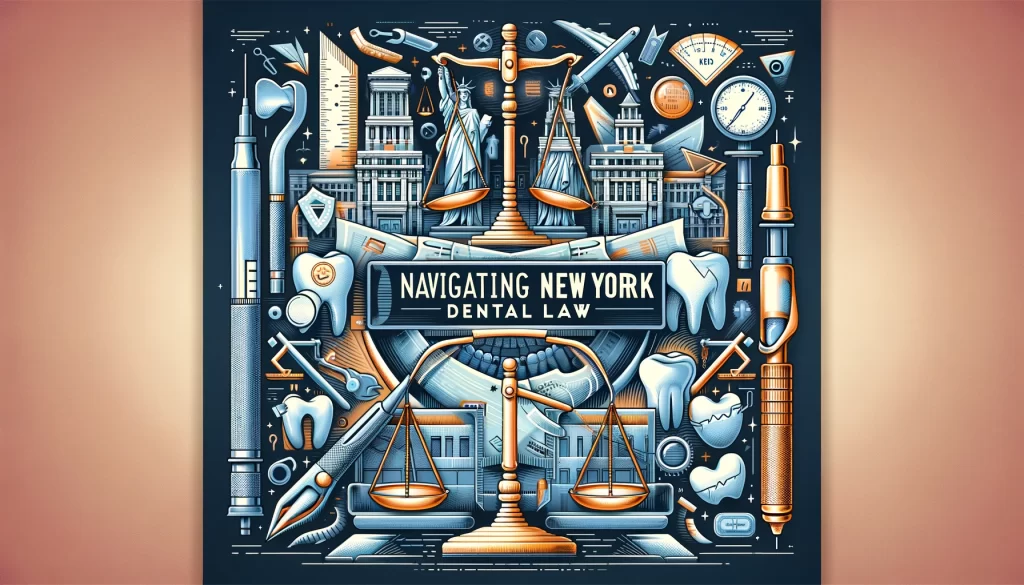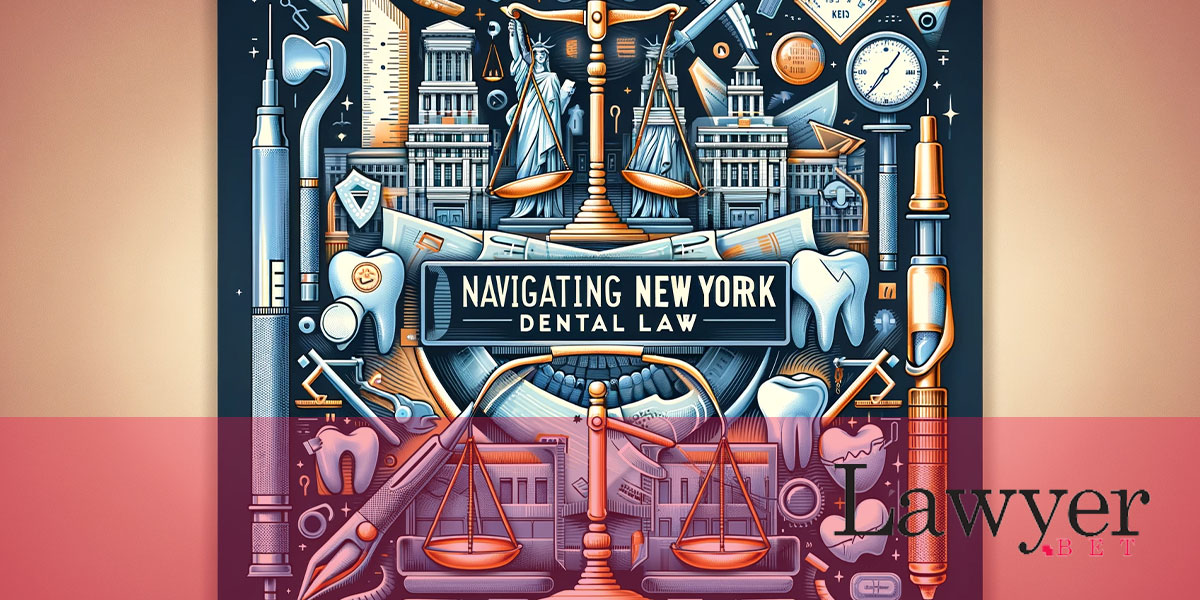Mastering New York Dental Law: Your Ultimate Guide
Understanding New York Dental Licensure
Licensing is the foundation of practicing dentistry in New York. Dentists must comply with New York State Education Department requirements to obtain and renew their license. The following guidelines outline the essential steps and requirements:
- Graduation from an ADA-approved dental school.
- Passing the National Board Dental Examinations (NBDE) and the New York State specific clinical examination.
- Completing a one-year residency program if not licensed in another jurisdiction.
Compliance with New York Dental Regulations
Dental compliance involves adhering to state laws and regulations to ensure the safety of patients and the credibility of the practice. Key compliance areas include:
Infection Control
New York State mandates rigorous infection control standards:
- Use of personal protective equipment (PPE).
- Proper sterilization practices.
- Adhering to CDC guidelines for dental settings.
Record Keeping and Confidentiality
Maintaining precise patient records is not only beneficial for treatment continuity but also legally required:
- Keeping accurate and up-to-date records for each patient.
- Ensuring patient confidentiality as per HIPAA regulations.
- Securing digital records to prevent data breaches.
Continuing Education (CE) Requirements
Licensed dentists in New York must participate in ongoing education to maintain their licensure:
- 50 hours of continuing education every three years.
- Specific courses in infection control and jurisprudence.
Navigating Dental Malpractice in New York
Understanding dental malpractice is crucial to safeguarding your practice against legal claims:
Common Causes of Malpractice Claims
- Misdiagnosis or delayed diagnosis.
- Surgical errors and complications.
- Failure to obtain informed consent.
- Poor documentation and record-keeping.
Preventive Measures
Proactive strategies to minimize the risk of malpractice claims include:
- Comprehensive patient consultations and informed consent forms.
- Regular training and updates on clinical techniques.
- Meticulous record-keeping practices.
Case Studies: Learning from Real-World Scenarios
Examining real-world cases can provide valuable insights into managing dental law and compliance:
Case Study 1: Misdiagnosis Leads to Malpractice Claim
Dr. Smith misdiagnosed a patient’s oral lesion, leading to a delayed cancer diagnosis. The patient sued for malpractice, resulting in a significant financial settlement. This case highlights the importance of continued education and having a second opinion on uncertain diagnoses.
Case Study 2: Documentation Saves the Day
Dr. Johnson was accused of performing unnecessary dental procedures. However, his meticulous record-keeping proved that the procedures were justified, leading to a case dismissal. This scenario underscores the importance of detailed and accurate patient records.
Practical Tips for Staying Compliant
Regular Audits and Assessments
Conduct periodic internal audits to identify and rectify non-compliance areas:
- Use checklists for infection control practices.
- Review patient records for completeness.
- Assess staff knowledge about current regulations.
Invest in Staff Training
Continuous staff training can prevent compliance issues and enhance patient care:
- Organize regular training sessions on HIPAA, infection control, and other relevant laws.
- Encourage staff to attend conferences and workshops.
Leverage Technology
Technology can streamline compliance efforts:
- Implement electronic health records (EHR) for better record management.
- Use HIPAA-compliant communication tools.
- Adopt dental software for scheduling and patient management.
Dentist’s First-Hand Experience
Dr. Emily Brown, a practicing dentist in New York, shares her insights:
“Navigating New York dental laws has been a learning curve. Investing in a good legal advisor and prioritizing continuous education has helped my practice thrive. Staying updated on new regulations is key to preventing legal issues.”
Commonly Asked Questions
Below is a table summarizing frequently asked questions about New York dental law:
| Question | Answer |
|---|---|
| How often do I need to renew my dental license? | Every three years. |
| What is the penalty for non-compliance with CE requirements? | Potential license suspension or revocation. |
| Where can I find the latest infection control guidelines? | Visit the CDC website. |
Additional Resources
For more detailed information, refer to the following resources:
- New York State Education Department – Dental
- American Dental Association (ADA)
- Centers for Disease Control and Prevention (CDC)
Understanding the Intricacies of New York Dental Legislation
Practicing dentistry in New York State involves adhering to a comprehensive set of regulations and standards aimed at ensuring top-notch patient care and maintaining professional integrity. For attorneys specializing in New York dental law, mastering these legal frameworks is crucial for offering superior guidance to dental professionals. This detailed guide explores the essential elements of dental legislation in New York, covering licensing, practice requirements, patient rights, and professional conduct, to help legal practitioners navigate these complex regulations effectively.
New York Dentist Licensing Criteria
Becoming a licensed dentist in New York is a rigorous process, reflecting the state’s dedication to high standards in dental care. Aspiring dentists must meet several requirements, including educational achievements, passing examinations, and upholding ethical standards.
Educational and Examination Criteria
A robust dental education, culminating in passing a series of exams that evaluate both theoretical knowledge and clinical skills, is the cornerstone for any dentist seeking licensure in New York.
Ongoing Education and Professional Growth
After obtaining a license, dentists are required to participate in continuous education and professional development activities to ensure their practices remain aligned with current standards and technological advancements in dentistry.
Compliance and Practice Standards
New York enforces stringent guidelines for dental practices, encompassing patient safety protocols, the use of dental materials, and technological standards. These regulations ensure that patient care remains at the highest level.
Patient Safety and Infection Control
A critical aspect of any dental practice is a stringent approach to patient safety and infection control, with specific regulations governing the sterilization of instruments and the management of clinical environments.
Privacy and Patient Records Management
Adhering to privacy laws, especially concerning the handling and protection of patient records, is a vital component of dental practice in New York. This compliance safeguards patient information and fosters trust.
Ethical Standards and Professional Conduct
The integrity of dental practice in New York is maintained through strict codes of professional conduct and ethical standards, guiding dentists in their interactions with patients, colleagues, and the broader community.
Addressing Professional Misconduct
New York has clear procedures for investigating and disciplining cases of professional misconduct, ensuring that the standards of dental practice are rigorously upheld.
Championing Patient Rights
Central to dental practice is the advocacy for patient rights, with dentists and legal professionals collaborating to ensure patients are well-informed, consenting, and receiving care that meets both legal and ethical standards.
Conclusion: Maintaining Excellence in New York Dental Practice
The landscape of dental law in New York is intricate, reflecting the state’s commitment to superior dental health and patient care. A thorough understanding of these laws is essential for legal professionals advising in this field. This guide offers a foundational overview, but continuous learning and engagement with the dental community are vital for staying updated in this dynamic area of law.

Mastering NYC Dental Regulations: Essential Insights
Grasping NYC Dental Regulations
As a dental professional in New York City, it is crucial to be thoroughly familiar with the regulations governing the industry. NYC has specific rules and guidelines that all dental practices must follow to maintain compliance and provide quality care to patients.
Key Regulations to Note:
- Licensing Requirements: Dentists, dental hygienists, and dental assistants must be licensed by the New York State Education Department to practice in NYC.
- Infection Control Practices: Dental offices must adhere to strict protocols for sterilization and disinfection to prevent the spread of infections.
- Patient Records: Dental practices must maintain accurate and up-to-date patient records in compliance with HIPAA regulations.
- X-ray Safety: Proper safeguards must be in place to protect patients and staff from unnecessary radiation exposure during X-ray procedures.
- Insurance Billing: Dental practices must bill insurance companies accurately and ethically to avoid fines and penalties.
Advantages of Compliance:
By mastering NYC dental regulations, dental professionals can ensure the safety of their patients and staff, avoid legal issues, and maintain a positive reputation within the community.
Practical Compliance Tips:
- Stay updated on regulatory changes by attending continuing education courses and workshops.
- Implement written policies and procedures for your practice to ensure consistency in compliance.
- Regularly audit your practice to identify areas of non-compliance and take corrective action promptly.
Case Study:
Dr. Smith, a dentist in NYC, recently invested in new sterilization equipment to comply with updated infection control regulations. As a result, her practice saw increased patient satisfaction and referrals.
Firsthand Experience:
As a dental hygienist in NYC, I have found that staying informed about dental regulations is crucial to providing quality care to my patients and maintaining a successful practice.
| Regulation | Importance |
|---|---|
| Licensing Requirements | Ensures competency of dental professionals |
| Infection Control Practices | Prevents the spread of infections in the office |
| Patient Records | Protects patient privacy and ensures continuity of care |
| X-ray Safety | Minimizes radiation exposure for patients and staff |
| Insurance Billing | Avoids legal issues and financial penalties |
The post Navigating New York Dental Law: A Guide appeared first on lawyer.bet.




